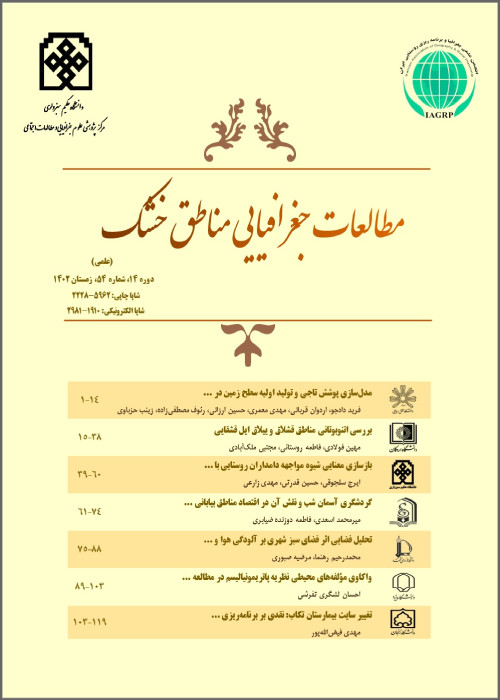A philosophical Approach to the Allocation or Aggregation of Geography
Geography first started with simple writing. But today, this science has gained a lot of potentials and with its technical tools which has at hand, has new specialized trends and is training new experts and specialists. Hence, in the present age, especially in Iran, geography is referred to as (interdisciplinary science), because it both studies natural sciences and human sciences. Based on the understanding of this challenge, the present paper tries to address the status of geographical knowledge from the point of view of unity and plurality. The outcome of this philosophical discussion in the field of aggregation or allocation of geographic science is to provide a new model and propose a unified approach while paying attention to plurality, in this way, as it is desirable and suitable, the necessary understanding of the tendencies in the geographic science was formed for readers and researchers in this field.
The present study, considering its approach to the subject, is the first scientific research in the field of pathological aggregation or allocation of geography science. Thus, the gathering of information in this article was done through interviews with experts [geographers], which lasted about one year. The questionnaire for interviewing and gathering information consists of four questions, which are based on the philosophy of geography science and the authors' perceptions of the existential nature of geography and also derived from other past works. Therefore, the selected statistical community to answer these fundamental philosophical questions includes 30 elites and academic scholars in the field of geography studies. Therefore, considering the importance of analyzing information and presenting research results, the data and information were analyzed by qualitative method (content analysis).
Among the interviewees, fourteen of them agreed one aggregation in one subject called Geography, and believing that specializing in geography did not make sense because it would lead to geography departing from its original nature, also moving to specialized field means breaking down geography rather than systematizing it. On this basis, in all over the world specialization has been to the detriment of geography because it has diminished the ability of graduates. However, the emphasis was on this main point that in the aggregation of geography there should be a general overview, and that aggregation itself is specialized in it, and we will not acquire it without aggregation, but that expertise depends on aggregation, and in the last decade, the philosophy of science has shifted to a philosophy of context. But from the point of view of the writers, the general approach takes geography to a "generalization" in which it speaks of mountains and rivers, which should not be directed by geography. In geography, instead of being global, it has to be a megaphone, a geography student who knows the ocean, knows the subject of the border, and knows the city and the countryside as well as the water crisis, and knows the city and the village too and is able to provide geographic analysis for it.
But from the viewpoint of sixteen experts in this field, the aggregation will have unpleasant consequences for the geography and geography family of (students and professors). Because each branches of geography has a separate property. Hence, these tendencies are complementary, but different in terms of content and scientific content. They also believe that aggregation gives a general approach to geography and it educates the graduates illiterate. Therefore, specialization is a necessity in science, and we should not forget the specialization of the approach in that science. They also emphasized that aggregation at this time point not only would not contribute to the sustainability of geography, but also wastes all the work done over the years. But for geographers, geography itself is a science, and its other branches are as sub-branches of this epistemic tree, so that the growth of the branches is possible only when its roots, that is, deeper themes and epistemic geography, can provide a more robust trunk in the sphere of existence for the branches to flourish. With these strategy, geography and specialization cannot be talked about because each branch considers itself a science, because this word in itself carries a rupture and disconnection, in which it considers the branch separate from the whole.
The results of the research indicate that the nature of geography is made up of (human + nature) [two fundamental wings], and its subject is "geographic space", and on the basis of which it can be defined as geography is a science that examines and recognize the action and interaction of (human beings with nature) - (nature with humans) with the aim of organizing the universal human life. In general, since the subject of geography is "geographic space", it cannot be said that geography is an interdisciplinary science. Because geography has a single subject that geographers study it. On this basis, if this approach is taken in the science of geography, geographers can, with a macro-vision, become good specialists. In other words, in this paper, the writers believe in heterogeneous unity at the same time as plurality of geography (The rule of unity over plurality).
- حق عضویت دریافتی صرف حمایت از نشریات عضو و نگهداری، تکمیل و توسعه مگیران میشود.
- پرداخت حق اشتراک و دانلود مقالات اجازه بازنشر آن در سایر رسانههای چاپی و دیجیتال را به کاربر نمیدهد.



